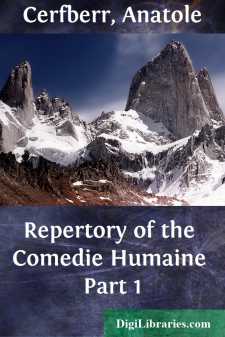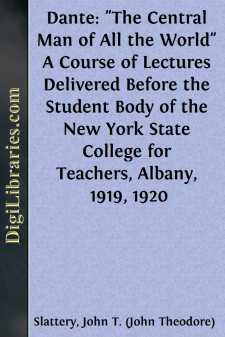Non-Classifiable
- Non-Classifiable 1768
Non-Classifiable Books
Sort by:
by:
Anatole Cerfberr
TRANSLATOR'S PREFACE "Work crowned by the French Academy" is a significant line borne by the title-page of the original edition of Messieurs Cerfberr and Christophe's monumental work. The motto indicates the high esteem in which the French authorities hold this very necessary adjunct to the great Balzacian structure. And even without this word of approval, the intelligent reader needs...
more...
by:
Austin Dobson
EARLY YEARS—FIRST PLAYS. Like his contemporary Smollett, Henry Fielding came of an ancient family, and might, in his Horatian moods, have traced his origin to Inachus. The lineage of the house of Denbigh, as given in Burke, fully justifies the splendid but sufficiently quoted eulogy of Gibbon. From that first Jeffrey of Hapsburgh, who came to England, temp. Henry III., and assumed the name of...
more...
DANTE AND HIS TIME To know Dante we must know the age which produced Christianity's greatest poet, he whom Ruskin calls "the central man of all the world, as representing in perfect balance the imaginative, moral and intellectual faculties, all at their highest." Other writers are not so dependent upon their times for our clear understanding of their books. Dante to be intelligible to the...
more...
by:
Fay-Cooper Cole
HABITAT. The west coast of Davao Gulf between Daliao and Digos is dotted with small villages, the inhabitants of which are largely Bagobo who have been converted to the Christian faith and have been induced to give up their mountain homes and settle in towns. Back of this coast line rise densely timbered mountain peaks, lateral spurs from which often terminate in abrupt cliffs overlooking the sea. From...
more...
by:
Oliver Herford
A is for Adams So A is for Adams, Oh! fortunate ALuck certainly seems to be coming your way. In the Days of my Infancy, A I recallStood for Ant or for Apple or anything small. Now A stands for Adams, Maude Adams, Hurray!I always said A would be Famous some day. B stands for the Boys B’s for the Boys, all as Busy as BeesThey are building a Little House under the TreesWith funny red walls and mossy...
more...
CHAPTER I FROM SCHOOL TO LIFE-WORK Birth—Parentage—School-days—Choice of Medical Profession—Charing Cross Hospital—End of Medical Studies—Admission to Naval Medical Service. Some men are born to greatness: even before their arrival in the world their future is marked out for them. All the advantages that wealth and the experience of friends can bring attend their growth to manhood, and...
more...
Cynarctus fortidens new species Holotype.—Right maxilla bearing P3, P4, and M1, No. 11353 KU; bluff on west side of Turkey Creek, approximately 75 feet above stream, Raymond Farr Ranch, Center NE, NE, S. 48 Blk. C-3, E. L. and R. R. Ry. Co., Donley County, Texas [approximately 6.5 miles north and 1 mile east of Clarendon], Clarendon fauna, Early Pliocene age. Obtained by W. W. Dalquest, on June 25,...
more...
CHAPTER I. NATURE OF THE ARGUMENT.Aim and line of argumentMy aim is to criticise from a purely English point of view the policy of Home Rule, or the proposal to create a more or less independent Parliament in Ireland; and as a result of such criticism to establish the truth, and develop the consequences, of this proposition—namely, that any system of Home Rule, whatever be the form it takes, is less...
more...
Extent and condition of the fishery in 1895 and 1896. While the number of nets operated in these two years was practically the same, the catch in 1896 was much greater than in 1895, and was one of the largest in the recent history of the fishery. A comparatively large number of fishermen reported that they took more salmon than in any previous year. The salmon, however, were smaller than usual, and...
more...
by:
Frank Sidgwick
PREFACE Of making selections of ballads there is no end. As a subject for the editor, they seem to be only less popular than Shakespeare, and every year sees a fresh output. But of late there has sprung up a custom of confusing the old with the new, the genuine with the imitation; and the products of civilised days, ‘ballads’ by courtesy or convention, are set beside the rugged and hard-featured...
more...











